The Bishop of Cork was a separate episcopal title which took its name after the city of Cork in Ireland. The title is now united with other bishoprics. In the Church of Ireland it is held by the Bishop of Cork, Cloyne and Ross, [1] and in the Roman Catholic Church it is held by the Bishop of Cork and Ross. [2]
The diocese of Cork was one of the twenty-four dioceses established at the Synod of Rathbreasail on an ancient bishopric founded by Saint Finbarr in the sixth-century.
On 30 July 1326, Pope John XXII, on the petition of King Edward II of England, issued a papal bull for the union of the bishoprics of Cork and Cloyne, the union to take effect on the death of either bishop. The union should have taken effect on the death of Philip of Slane in 1327, however, bishops were still appointed to each separate bishopric. The union eventually took place with Jordan Purcell appointed bishop of the united see of Cork and Cloyne in 1429. [3]
| List of pre-Reformation Bishops of Cork [3] | |||
|---|---|---|---|
| From | Until | Incumbent | Notes |
| unknown | 1147 | Ua Menngoráin | Died in office |
| bef.1148 | 1172 | Gilla Áedha Ua Maigín | Died in office; also known as Gregorius. |
| fl.1173–77 | 1182 | Gregorius Ua h-Aedha | Died in office |
| c.1182 | 1187 | Reginaldus I | Died in office |
| c.1187 | 1188 | Aicher | Died in office |
| bef.1192 | 1206 | Murchad Ua h-Áedha | Died in office |
| bef.1208 | 1224 | Mairín Ua Briain, O.S.A. | Translated to Cashel 20 June 1224; also known as Marinus. |
| 1225 | aft.1237 | Gilbertus | Elected before 5 June 1225; died after 1237. |
| 1248 | 1265 | Laurentius | Elected before 5 May 1248; died before 27 March 1265. |
| 1265 | 1267 | William of Jerpoint, O.Cist. | Elected after 27 March 1265; received possession of temporalities 28 November 1266; died after 8 July 1267. |
| 1267 | 1276 | Reginaldus II | Elected before 5 August 1267; died 16 December 1276. |
| 1277 | 1302 | Robert Mac Donnchada, O.Cist. | Elected before 8 May 1277; received possession of temporalities 11 June 1277; lib. 13 October 1277; died 6 March 1302. |
| 1302 | 1321 | Seoán Mac Cearbaill | Elected 30 April 1302; received possession of temporalities 12 June 1302; lib 20 July 1302; translated to Meath 20 February 1321. |
| 1321 | 1327 | Philip of Slane, O.P. | Appointed 20 February 1321; temp 16 July 1321; died after March 1327. |
| 1327 | 1329 | Walter le Rede | Appointed 20 March 1327; consecrated before 12 July 1327; temp 18 October 1327; translated to Cashel 20 October 1329. |
| 1330 | 1347 | John of Ballyconingham | Translated from Down before January 1329; received possession of temporalities 30 May 1330; died 29 May 1347. |
| 1347 | 1358 | John Roche | Elected before December 1347; consecrated December 1347; died 4 July 1358. |
| 1359 | 1393 | Gerald de Barri | Appointed before 14 February 1359 and consecrated irregularly soon afterwards; received possession of temporalities 2 February 1360; appointed again 8 November 1362 and confirmed 1 February 1365; died 4 January 1393. |
| 1396 | 1406 | Roger Ellesmere | Appointed 3 December 1395; received possession of temporalities 31 March 1396; died before 14 February 1406. |
| 1406 | 1409 | Richard Kynmoure | Appointed before 6 October 1406; died before June 1409. |
| 1409 | unknown | Milo fitzJohn | Appointed by Pope Gregory XII July 1409; appointed again by Pope Martin V 11 January 1418; died mid-June 1431 |
| 1409 | 1417 | Patrick Fox | Appointed by Antipope Alexander V 14 October 1409; confirmed by Antipope John XXIII 25 May 1410; translated to Ossory 15 December 1417. |
| 1425 | John Paston, O.S.B. | Prior of Brownholm; appointed 23 May 1425 but did not possession of the see; died in Utrecht before 1459. | |
| In 1429, the see united with Cloyne to form the united see of Cork and Cloyne | |||
Following the Reformation, the united see of Cork and Cloyne continued with parallel apostolic successions. In the Church of Ireland, the title eventually became part of the current united bishopric of Cork, Cloyne and Ross.
In the Roman Catholic Church, Cork and Cloyne remained united until 10 December 1747 when Pope Benedict XIV decreed them to be separated. Cloyne became part of the united bishopric of Cloyne and Ross until 24 November 1850 when they were separated. The see of Cork remained a separate bishopric until 19 April 1958 when it united with Ross to form the current united bishopric of Cork and Ross.
| List of post-Reformation Roman Catholic Bishops of Cork [4] [5] | |||
|---|---|---|---|
| From | Until | Incumbent | Notes |
| 1748 | 1763 | Richard Walsh | Appointed 10 January 1748; died 7 January 1763 |
| 1763 | 1787 | John Butler | Appointed 16 April 1763; also became 12th Baron Dunboyne in 1785; resigned as bishop 13 December 1787; died 8 May 1800. |
| 1787 | 1815 | Francis Moylan | Translated from Ardfert and Aghadoe 19 June 1787; died 10 February 1815 |
| 1815 | 1847 | John Murphy | Appointed coadjutor bishop 25 January 1815; succeeded 10 February 1815; consecrated 23 April 1815; died 1 April 1847 |
| 1847 | 1886 | William Delany | Appointed 9 July 1847; consecrated 15 August 1847; died 14 November 1886 |
| 1886 | 1916 | Thomas Alphonsus O'Callaghan , O.P. | Appointed coadjutor bishop 29 June 1884; succeeded 14 November 1886; died 14 June 1916 |
| 1916 | 1952 | Daniel Cohalan | Appointed an auxiliary bishop 25 May and consecrated 7 June 1914; appointed Bishop of Cork 29 August 1916; died 24 August 1952 |
| 1952 | 1958 | Cornelius Lucey | Appointed coadjutor bishop 18 November 1950; consecrated 14 January 1951; succeeded 24 August 1952; also appointed Apostolic Administrator of Ross 20 February 1954; subsequently bishop of Cork and Ross when the two dioceses were united in 1958 |
| Since 1958, the see has been part of the united diocese of Cork and Ross | |||
The Bishop of Clonfert is an episcopal title which takes its name after the village of Clonfert in County Galway, Ireland. In the Roman Catholic Church it remains as a separate title; but in the Church of Ireland it has been united with other bishoprics.
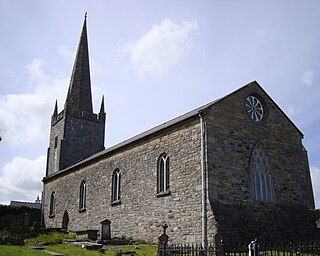
The Bishop of Killala is an episcopal title which takes its name after the village of Killala in County Mayo, Ireland. In the Roman Catholic Church it remains a separate title, but in the Church of Ireland it has been united with other bishoprics.
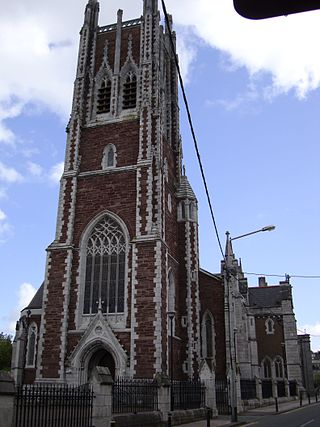
The Diocese of Cork and Ross is a Latin diocese of the Catholic Church in Ireland, one of six suffragan dioceses in the ecclesiastical province of Cashel and Emly.
The Diocese of Cork was established in the seventh century. The diocese of Cork was one of the twenty-four dioceses established at the Synod of Rathbreasail on an ancient bishopric founded by Saint Finbarr in the sixth-century. On 30 July 1326, Pope John XXII, on the petition of King Edward II of England, issued a papal bull for the union of the bishoprics of Cork and Cloyne, the union to take effect on the death of either bishop. The union should have taken effect on the death of Philip of Slane in 1327, however, bishops were still appointed to each separate bishopric. The union eventually took place with Jordan Purcell appointed bishop of the united see of Cork and Cloyne in 1429.
The Bishop of Connor is an episcopal title which takes its name after the village of Connor in County Antrim, Northern Ireland. The title is currently used by the Church of Ireland, but in the Roman Catholic Church it has been united with another bishopric.
The Bishop of Achonry is an episcopal title which takes its name after the village of Achonry in County Sligo, Ireland. In the Roman Catholic Church it remains as a separate title, but in the Church of Ireland it has been united with other bishoprics.

The Bishop of Ferns is an episcopal title which takes its name after the village of Ferns in County Wexford, Ireland. In the Roman Catholic Church it remains a separate title, but in the Church of Ireland it has been united with other bishoprics.
The Bishop of Cloyne is an episcopal title that takes its name after the small town of Cloyne in County Cork, Republic of Ireland. In the Roman Catholic Church, it is a separate title; but, in the Church of Ireland, it has been united with other bishoprics.
The Bishop of Down and Connor is an episcopal title which takes its name from the town of Downpatrick and the village of Connor in Northern Ireland. The title is still used by the Catholic Church for the diocese of that name, but in the Church of Ireland it has been modified into other bishoprics.
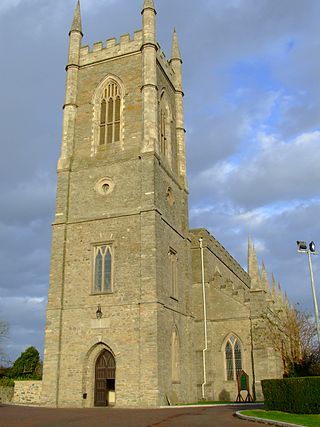
The Bishop of Down was an episcopal title which took its name from the town of Downpatrick in Northern Ireland. The bishop's seat (Cathedra) was located on the site of present cathedral church of the Holy and Undivided Trinity in the Church of Ireland.

The Bishop of Limerick is an episcopal title which takes its name after the city of Limerick in the Province of Munster, Ireland. In the Catholic Church it still continues as a separate title, but in the Church of Ireland it has been united with other bishoprics.
The Bishop of Kilfenora was a distinct episcopal title which took its name from the village of Kilfenora in County Clare in the Republic of Ireland. In both the Church of Ireland and the Roman Catholic Church, the title is now united with other bishoprics.
The Bishop of Waterford and Lismore is an episcopal title which takes its name after the city of Waterford and town of Lismore in Ireland. The title was used by the Church of Ireland until 1838, and is still used by the Roman Catholic Church.
The Bishop of Cork and Cloyne was an episcopal title which took its name after the city of Cork and the town of Cloyne in southern Ireland.
The Diocese of Ross was a separate diocese situated in south-west Ireland. Following the Reformation, there were two dioceses. In the Church of Ireland, the diocese is now part of the Diocese of Cork, Cloyne and Ross. In the Roman Catholic Church, it is part of the Diocese of Cork and Ross. In the 19th century, an exclave of the diocese existed around that part of the Beara peninsula in County Cork including the area around Glengariff though not as far east as Bantry. The main diocesan territory was centred on the towns of Baltimore, Skibbereen, Rosscarbery and Clonakilty which lie along the modern national road N71.
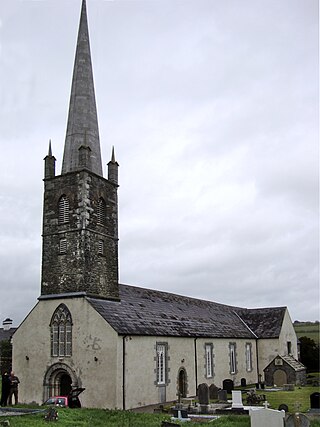
The Bishop of Ross was a separate episcopal title which took its name after the town of Rosscarbery in County Cork, Ireland. The title is now united with other bishoprics. In the Church of Ireland it is held by the Bishop of Cork, Cloyne and Ross, and in the Roman Catholic Church it is held by the Bishop of Cork and Ross.
The Bishop of Cork and Ross is an episcopal title which takes its name after the city of Cork and the County Cork town of Rosscarbery in the Republic of Ireland. The combined title was first used by the Church of Ireland from 1638 to 1660 and again from 1679 to 1835. At present the title is being used by the Roman Catholic Church.
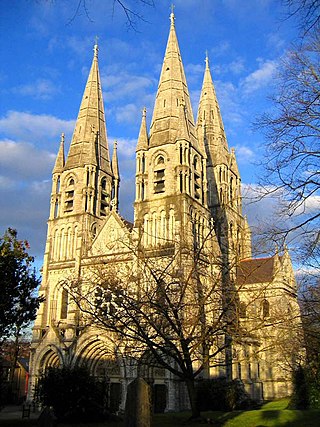
The Diocese of Cork, Cloyne and Ross, also referred to as the United Diocese of Cork, Cloyne and Ross, is a diocese in the Church of Ireland. The diocese is in the ecclesiastical province of Dublin. It is the see of the Bishop of Cork, Cloyne and Ross, the result of a combination of the bishoprics of Cork and Cloyne and Ross in 1583, the separation of Cork and Ross and Cloyne in 1660, and the re-combination of Cork and Ross and Cloyne in 1835.
The Bishop of Derry is an episcopal title which takes its name after the monastic settlement originally founded at Daire Calgach and later known as Daire Colm Cille, Anglicised as Derry. In the Roman Catholic Church it remains a separate title, but in the Church of Ireland it has been united with another bishopric.
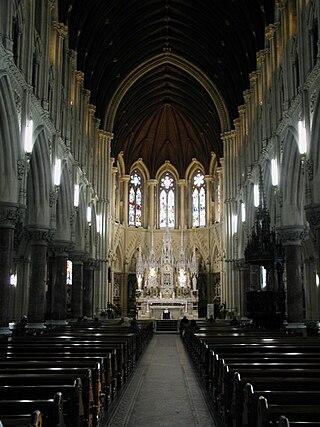
The Diocese of Cloyne is a Latin diocese of the Catholic Church in Ireland. It is one of six suffragan dioceses in the ecclesiastical province of Cashel.